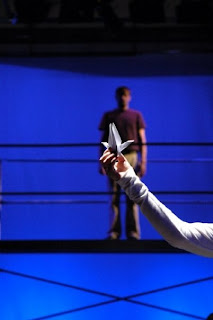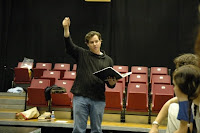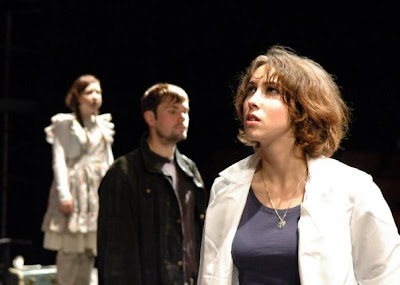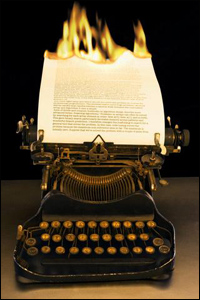
Over this past weekend we watched the indie film from the U.K. called Son of Rambow (made by writer/director Garth Jennings who also did the film of Hitchhiker’s Guide to the Galaxy).
You can check out clips and get info on the movie at their website.
This sweet little film hit me right in the cockles of my heart for various reasons. First, the main characters are 10 year old boys in 1982. That same year I was a ten year old boy in Reno. So I remember the 80s music, the hairstyles, the clothes, the cold war, all that. And second, these kids run around and do various stunts in the forest playing Rambo and then film it with a VHS camera. Similarly, I fell out of a tree and swung on a tree rope several times ala Indiana Jones while my friend used his behemoth video camera—in fact, I wrote my first screenplay in 4th grade, SUPER SLEUTHES, a comedy with a lot of jokes about farts and pimples.
We intended to shoot the script in the summer of '83 but ran out of funding.
Son of Rambow is more complex and has more depth than Super Sleuthes, and far less fart jokes. It’s a story about friendship and family but trust me, this is not really a kid’s film. It will appeal probably more to adults, definitely more Stand By Me than The Sandlot.
What is particularly relevant to writers is that the story is based on the writer/directors’ own childhood experience. He really did watch a pirated video of Rambo: First Blood and then picked up a video camera and filmed himself and his friends. It’s how he got started making movies, actually. But in an interview he said he was first draft of the script was “rubbish” because he literally put down on paper “what really happened”.
This issue comes up a lot when dealing with material that is historically or personally factual.
“But it really happened that way!” is a phrase I’ve heard from playwrights young and old, alike, and it’s usually in defense of something that is not working in the script. Sometimes “what really happened” really works, but usually only in extreme circumstances like Apollo 13 or Blackhawk Down. Not so much in childhood memories. They seem extreme at the time but usually they’re pretty freaking boring.
As soon as you put a real event or person in your story then that material becomes fiction. This is a beautiful concept because it literally gives you permission as the writer to change anything you want. When you’re filing a police report, you’re talking about real people and the cops don’t really want you to lie or exaggerate. But when you’re telling a story, you don’t have to deal with facts. These are fictional characters. The “it really happened” police aren’t going to arrest you for falsifying your testimony.

In Son of Rambow, Will, the young protagonist, is in an extremely religious family, members of the Plymouth Brethren. He’s not allowed to listen to secular music or watch TV. There’s even a scene where he has to step out of the classroom when they watch a documentary (which is also how he meets up with the other miscreant character, Lee). But through the chain of events we call plot, he ends up watching a pirated copy of Rambo. The movie blows his mind and he runs home pretending to rescue his father from an army prison.
Now, did the writer/director grow up in a religious family?
No.
In interviews, he says he had a happy childhood, a great family, and was allowed to play and do whatever he wanted. But he knows a happy childhood on screen is a bad movie. He remembered he knew a neighbor kid, though, whose family was part of the brethren. He discovered that all he had to do was move his story next door and suddenly he had a major conflict. He could still use the same events and ideas, but now there was more at stake.
Of course, he made that discovery from rewriting.
Yes, I know, again with the rewriting! But that’s where the real writing happens. First drafts are usually rubbish. You have to keep plodding on through and keep reworking the story until it works. It’s the difference between a lazy writer and a professional.
Which reminds me…I gotta take a look at that TYA tour script again. Time to do some rewrites on that.
For now during the holidays, I’m reading a few books for pleasure (instead of scholarly or work-related materials). On my bedstand is Tree of Smoke by Denis Johnson, a book of short stories by Miranda July and then I might dip into The Stupidest Angel by Christopher Moore and Northline by Willy Vlautin.
Sometimes I feel starved to sit down and absorb some brilliant writing, whether it’s a script or fiction or nonfiction. There’s real pleasure in enjoying someone else’s ability to put a brilliant sentence together or tell a great story.
I have other hidden agendas for reading, too. I’ve wanted to adapt something for a solo show but the book I had looked at for this purpose just disappointed me. I really would like to try my hand at an adaptation some day but need to find something I really want to devote my time and energy to. So sometimes I read a book and think, how would this translate to a film or play?
Meanwhile, in the next month or so I’ll do some more work on 7 MINUTES TO MIDNIGHT as we gear up to head off to the KCACTF festival in February. I’m so looking forward to diving back into that multi-layered piece, as well as working with my fabulous and talented cast.
Oh, right, and then I have a short puppet play to write for a friend of mine in Chicago.
Man, it’s already a busy year and it ain’t even started yet…







